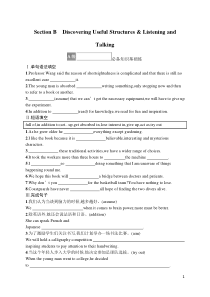 DOC
DOC
【文档说明】Section B Discovering Useful Structures & Listening and Talking.docx,共(7)页,43.301 KB,由管理员店铺上传
转载请保留链接:https://www.doc5u.com/view-c803464ca1779949bc28dd87384a2e47.html
以下为本文档部分文字说明:
1SectionBDiscoveringUsefulStructures&ListeningandTalking必备知识基础练Ⅰ.单句语法填空1.ProfessorWangsaidthereasonofshortsightednessiscomplicatedand
thatthereisstillnoexcellentcureit.2.Theyoungmanisabsorbedwritingsomething,onlystoppingnowandthentorefertoabookoranother.3.(assume)thatwecan’tget
thenecessaryequipment,wewillhavetogiveuptheexperiment.4.Inadditionto(read)forknowledge,wereadforfunandinspiration.Ⅱ.短语填空fullof,inadditionto,set..
.up,getabsorbedin,loseinterestin,giveup,actas,tryout1.Ashegrewolderheeverythingexceptgardening.2.Ilikethebookbecauseitisbelievab
le,interestingandmysteriouscharacters.3.thesetraditionalactivities,wehaveawiderrangeofchoices.4.Ittooktheworkersmoreth
anthreehourstothemachine.5.IsodoingsomethingthatIamunawareofthingshappeningroundme.6.Wehopethisbookwillabridgeb
etweendoctorsandpatients.7.Whydon’tyouforthebasketballteam?Youhavenothingtolose.8.Coastguardshaveneverallhopeoffindingthetwodiversalive.Ⅲ.完
成句子1.我们认为当谈到脑力的时候,越多越好。(assume)Wewhenitcomestobrainpower,moremustbebetter.2.除英语外,她还会说法语和日语。(addition)Shecans
peakFrenchandJapanese.3.为了激励学生们关注书写,我们计划举办一场书法比赛。(aim)Wewillholdacalligraphycompetitioninspiringstudentstopayattentiontotheirha
ndwriting.4.当这个年轻人步入大学的时候,他决定参加足球队选拔。(tryout)Whentheyoungmanwenttocollege,hedecidedto.25.噪声似乎是从楼下传来的。(asif)theno
isecomesfromdownstairs.Ⅳ.微语法填空SongQingling,1.(bear)on27thJanuary1893inShanghai,oneofthegreatest2.(leader)ofChina,wasawell-knownstateswoman.Whenshew
asyoung,shewasmuch3.(concern)aboutthefutureofChina.Latershetookpart4.manyactivitiestofightforthefreedomofChinesepeople.5.thefoundationofthePRC,shewa
s6.(complete)devotedtothe7.(develop)ofnewChinaandplayedanimportantpartinmanyactivities.On8thMay1981,shediedinBeijingattheage
of88,8.broughtgreatsorrowtotheChinesepeople.9.(honour)asoneofthegreatestwomenofthe20thcentury,she10.(remember)bytheChinesepeopleforever
.能力素养提升练Ⅴ.阅读理解Now,jazzmusicisanimportantpartofIndianapolis’artculture.JazzclubsaroundthecitystillhostconcertswithlocaljazzmusicianslikeRobDixo
nandJoelTucker.Oneoftheseclubs,theChatterboxJazzClub,stillhaslivejazzsevennightsaweek.ButtherealhistoryofjazzinIndyismuchlesssimp
le.AlongwiththeAvenue’sculture,jazzmusicwasgonefromthestreetsformanyyears.IndianaAvenuewastheheartofaneighbor
hoodalongtheWhiteRiver.Itwasacenterforblackmusicandlivestreetmusic.Thewealthyavoidedthisarea.Soitbecameaplacet
hatpoorerfamilies,includingmanyAfrican-Americanandimmigrant(移民)families,movedto.JazzprosperedinthemixofAmeri
canculturesaroundtheAvenueinthe1930sand1940s.Butinthe1950s,thingschanged.Afterthewar,therewereprojectstomakethecityb
eautifulandbuildauniversitynearby.Bothoftheseseemedlikegoodchanges.However,thenewuniversityandbuildingscausedpoorerfamiliestohavetolea
vethearea.ThisdestroyedtheIndianaAvenuecommunity—andwithit,itsjazzculture.Aftermanyyears,Indianapolisrememberedthevalueofitsartsandmusiccu
lture.ItbegantobringbacklostculturessuchaslivemusicontheAvenue.Todoso,itbegantomakenewchanges.Thechangesinclude
drepairinghistoricareasliketheAvenue.Onceagain,thehighlivingcostsinthesehistoricartsareaspushedlow-incomefamil
iesout.Todaythereareseveralold-stylejazzclubswherefriendscanmeetuptorememberthepastorjustenjoyasummer
evening.Itmightseematfirstthatjazzisaliveagain,butthereisasadrealitybehindthesejazzclubs:ModernIndyjazzisonlyashadowofthelivel
yculturethatwasonceonIndianaAvenue.1.Whatdoestheauthormainlywanttosayinparagraph1?A.Jazzclubscanmakemoney.3B.Jazzmusiciansoftenholdcon
certs.C.JazzmusicispopularinIndianapolis.D.JazzcultureisjustpartofIndianapolis’culture.2.Whatdoestheunderlinedword“prosp
ered”inparagraph4mean?A.Disappearedquickly.B.Arrivedsoon.C.Recoveredsoon.D.Developedwell.3.WhatdidIndianapolisdotobrin
gbackitslostculture?A.Itrebuiltsomeoldimportantareas.B.Itinvitedoldjazzmusicianstosinginthecity.C.Iteducatedpeopl
eaboutthevalueofmusicculture.D.Itsettledlow-incomefamiliesintheIndianaAvenuecommunity.4.Accordingtothepassage,whichofthefoll
owingaboutmodernIndyjazzistrue?A.Itshomecultureisgone.B.Itsstylesaretootraditional.C.Itshowsthesadnessofthepo
or.D.Itisnolongerafavoriteoftheyoung.Ⅵ.七选五Howsimilararelanguageandmusic?Languageispartofourdailylife,nomatterwhereweliveinthe
world.Itisthesamewithmusic,whetheryoulistentoitontheradioonyourdrivetoworkorsitbeforeanorchestra.Bothlanguageandmusicplayahugeroleinou
rculture.1·Bothlanguageandmusichaveawritingsystem.InEnglishwerecordlanguageusingthealphabet,whichisacollectionofletters.Similarly,weusenotestokeepare
cordofmusic.Musiciansreadnotesandcreatemeaningintheformofmusic.2Bywritingpiecesoftextormusic,weareabletoshareexperiencesthrou
ghtime.Wecanreadtheideasorhearthecompositionofsomeonewholivedhundredsofyearsago.·3Youcanmakeagoodguessatwheresomeoneisfrombylisteningtothelang
uagetheyuse.Inthesameway,weknowthatstylesofmusicaredifferentaroundtheworld,givingustheopportunitytoexplore
manydifferentculturesthroughtheirmusicandprovidinguswithmusicforeverysituation.·Bothshareemotion.4Ofcourseyoumaybeabletoseeiti
nmyface,butyouwillknowforsurethroughmywords.Similarly,musiccansoundangry,sadorhappy.Musiccanshowyouexactlyhowthecomposerwasoris
feeling,andallowsustoshareinthatemotion.Whenyoufeel4happy,youmightwanttosinganddancetoahappysongtocelebrateyourhappiness.5Ithink
wehaveallusedmusictoexpressorprocessouremotions,oftencombiningitwithlanguageintheformofsonglyrics.A.Bothareexpressive.B.Bothvarywithculture
.C.Herearesomeoftheirsimilarities.D.HowdoyouknowthatIamangry?E.Weuselanguagetoexpressourthoughts.F.SojustasyoureadEnglis
h,youcanreadmusic.G.Incontrast,youprobablyalsolistentosadmusicwhenyouarefeelingdown.Ⅶ.完形填空Foralongtime,Gabrieldidn’twanttobeinvolvedinmusica
tall.Inhisfirstyearsofhighschool,Gabrielwouldlookpityinglyatmusicstudents,strugglingacrossthecampuswiththeirheavyinstrumen
tcases,turningupatschoolfor1hoursbeforeanyoneelsehadtobethere.Heswore(发誓)tohimselfto2music,ashehatedgett
ingtoschoolsoearly.3,oneday,inthemusicclassthatwas4ofhisschool’scurriculum(课程),hewasplayingidly(随意地)onthepianoandfou
ndit5topickouttunes.Withasinkingfeeling,herealizedthatheactually6doingit.Hetriedtohidehisobviouspleasurefromth
emusicteacher,whohad7overtolisten.Hemightnothavedonethisparticularly8,becausetheteachertoldGabrielthathehadagood9andsuggestedthatGabrielgointothemusi
cstore-roomtoseeifanyoftheinstrumentsthere10him.Therehedecidedtogivethecello(大提琴)a11.Whenhebeganpracticing,hetookitvery12.Buthequicklyfou
ndthathelovedplayingthisinstrument,andwascommittedtopracticingitsothatwithinacoupleofmonthshewasplayingreasonablywell.
Thismeant,ofcourse,thathearrivedatschoolearlyinthemorning,13hisheavyinstrumentcaseacrossthecampustothe14looksofthenon-musicianshehad15behind.1.A
.practiceB.performanceC.musicD.meeting2.A.missB.acceptC.avoidD.appreciate3.A.ThereforeB.HoweverC.ThusD.Moreover4.A.partB.na
tureC.basisD.spirit5.A.complicateB.safeC.confusingD.easy6.A.missedB.disliked5C.enjoyedD.denied7.A.runB.joggedC.jumpedD.wandered8.A.wellB.har
dC.badlyD.easily9.A.earB.tasteC.heartD.voice10.A.occurredtoB.tooktoC.appealedtoD.heldto11.A.changeB.chanc
eC.taskD.job12.A.seriouslyB.proudlyC.casuallyD.carelessly13.A.pushingB.draggingC.liftingD.rushing14.A.admiri
ngB.pityingC.annoyingD.laughing15.A.rushedB.goneC.leftD.forgotten6答案:Ⅰ.1.for2.in3.Assuming4.readingⅡ.1.lostinterestin2.fullof3.Inadditionto4.
set;up5.get;absorbedin6.actas7.tryout8.givenupⅢ.1.assumethat2.inadditiontoEnglish3.withtheaimof4.tryoutforthefootballteam5.Itseemsasif/thoug
hⅣ.1.born2.leaders3.concerned4.in5.After6.completely7.development8.which9.Honoured10.isrememberedⅤ.【语篇导读】本文是一篇说明文。文章讲述了目前爵士乐仍然是印第安纳波利斯艺术文化的重要组成部分,但是
它的本土文化消失了。1.C段落大意题。根据第一段中“Now,jazzmusicisanimportantpartofIndianapolis’artculture.”可知,第一段主要是介绍了爵士乐在印第安纳波利斯很受欢迎。故选C项。2.D词义猜测题。根据第四段中画线词下文
可知,转折词But之后描述了爵士乐的衰落,因此推测出画线词prospered意为“兴盛、蓬勃发展”。故选D项。3.A细节理解题。根据倒数第二段中“Thechangesincludedrepairinghis
toricareasliketheAvenue.”可知,它重建了一些旧的重要区域。故选A项。4.A细节理解题。根据最后一段中“ModernIndyjazzisonlyashadowofthelivelyculturethatwasonceonIndianaAven
ue.”可知,爵士乐的本土文化消失了。故选A项。Ⅵ.【语篇导读】本文是一篇说明文。文章主要介绍了语言和音乐有哪些相同之处。1.C根据上文“Bothlanguageandmusicplayahugeroleinourculture.”可知,语言和音乐在我们的文化中扮演着重要的角色,下文介
绍了语言和音乐的一系列共同点。故选C项,意思是:以下是它们的一些相似之处。2.F根据设空前两句可知英语和音乐都是可以被记录下来并且能读取的。F项的意思是:正像你可以读英语一样,你也能读音乐。能起到承接上文的作用,
故选F项。3.B本空下段落的主要内容是音乐和语言都随着文化而变化。关键词是culture。故选B项。4.D根据空后的“Ofcourseyoumaybeabletoseeitinmyface,butyouwillknowforsuret
hroughmywords.Similarly,musiccansoundangry,sadorhappy.”可知这里是说人们可以通过语言和音乐表达气愤和其他情绪,故选D项,意思是:你怎么知道我生气了?5.GG项中的“sadmusi
c”及“feelingdown”与空前一句中的“happysong”及“feelhappy”相对照,符合语境,故选G项。Ⅶ.【语篇导读】本文是一篇记叙文。文章描述了主人公Gabriel从不喜欢音乐到喜欢的过程。每个人都应该发现自己的兴趣所在,并为其投入时间和精力。1.A“anyoneels
e”指不学音乐的学生,学习音乐的要比规定的到校时间早到几个小时进行乐器练习,因此填practice。因为是上课,故performance不正确。2.C根据“ashehatedgettingtoschoolsoearly”可知,Gabriel讨厌过早到校,因此他对自己发
誓“不学”音乐,故C项符合语境。3.B本段讲Gabriel在一次音乐课上意外发现自己很喜欢音乐,与上一段是转折关系,故选B项。74.A音乐课是学校的标准课程的一部分。故选A项。5.D根据下句“actually...triedtohide..
.pleasure”等信息可以看出,Gabriel在音乐中找到了乐趣,发现“演奏音乐很容易”。只有D项符合语境。6.C根据actually可知,Gabriel对音乐的看法有了变化,他实际上是喜欢音乐的,故选enjoyed。7.D音乐老师在教室里来回走动,听到Gabr
iel弹奏钢琴的声音,就走过来聆听。wander“漫游,闲逛,徘徊”符合语境。8.A根据“andsuggestedthatGabrielgointothemusicstore-roomtoseeifanyoftheinstruments”可知,老师让Gabriel挑选乐器,说明他弹得不
够好,钢琴不太适合他,因此选well。9.A老师认为Gabriel有着很好的辨音能力,并建议他去挑一件称心的乐器。ear“辨音力,灵敏的听力”。10.Cappealto“有吸引力,引起兴趣”。老师让Gabriel找一件吸引自己的乐器。11.BGabriel
准备试一下大提琴,给大提琴一次机会,即尝试拉一下大提琴,故选B项。12.C根据But可知,前后是转折关系,下句说Gabriel发现自己很喜欢大提琴,说明前一句是说他只是“随便”拉一下。因此选C项。13.B开始学习音乐之后,Gabriel不得不拖着沉重的乐器早早地到学校练习拉琴。drag指吃力地拖
、拉某物,符合语境。14.B根据“non-musicians”可知,这里指不学音乐的学生的表情,根据第一段可知,不学音乐的学生对学音乐的学生投去同情的目光,故选pitying。15.Cleavesb/sthbehind“把……抛在后面,超过
”。学习音乐就意味着要被其他学生用同情的目光注视,这里指Gabriel走过去之后,身后的学生对他投来同情的目光。故选C项。